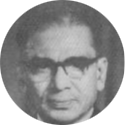A.K. Sarkar

A.K. Sarkar
8th Chief Justice of India
Assumed Office16th Mar, 1966
Retired On29th Jun, 1966
Previously
Leads Inquiry Commission addressing issues with Council of Scientific and Industrial Research1967-68
Chairman of Inquiry Commission investigating steel transactions1966-67
Led Committee on Cow Protection1966
Retired as Chief Justice of IndiaJune 29, 1966
Appointed as Chief Justice of IndiaMarch 16, 1966
Appointed as Judge at the Supreme CourtMarch 4, 1957
Appointed as permanent Judge, Calcutta High CourtJanuary 23, 1950 - March 3, 1957
Appointed as temporary Judge at the High Court of CalcuttaJanuary 25, 1949
Enrols as advocate at the High Court of CalcuttaJanuary 9, 1930
Called to the bar from Lincoln’s InnJanuary 28, 1929
Enrols as vakil at Calcutta High CourtSeptember 27, 1922
Profile
Born on June 29th, 1901, in Dhaka (then part of undivided India), Justice Amal Kumar Sarkar served as the 8th Chief Justice of India. Sarkar J is often remembered for writing 69 separate opinions: of which 38 concurred with the Judgment and 31 dissented from it.
Sarkar J completed his LLB in Calcutta in 1926; he then moved to England and was later called to the bar from Lincoln’s Inn in 1929. Upon returning to India, Sarkar J enrolled as an advocate at the Calcutta High Court in 1930. Just under 20 years later, he was made a permanent Judge at the Court in 1950, a position he held until 1957. In 1957, sixth in seniority, he was appointed as a Judge at the Supreme Court. On March 16, 1966, he was elevated to Chief Justice of India—he served the position for only 14 weeks.
Inconsistent application of the seniority principle appears across Sarkar J’s career. For example, P.B. Chakravartti, the first Indian Chief Justice of the Calcutta High Court serving from 1952-58, was asked to join the Supreme Court. Chakravartti J deferred the offer due to personal reasons—in the meantime, his junior Sarkar J was appointed to the SC in 1957. After finding out about this, Chakravartti J refused to join the Supreme Court. Later on in his career, while Chief Justice, Sarkar J sought to appoint Justice Mitter of the Calcutta High Court to the SC—he was fourth in seniority at the time. Complaints on the appointment reached the Chief Minister of West Bengal and even the Home Ministry—the latter even sent Sarkar J a concerned letter on the appointment. Sarkar persevered with his choice, and Mitter J was eventually appointed to the SC in 1966.
Post retirement on June 29, 1966, Sarkar J chaired many government commissions. These included commissions on cow protection (1966), corrupt steel transactions (1966-67), and issues with the Council of Scientific and Industrial Research.
While at the Supreme Court, Sarkar J authored 228 Judgements and sat on 653 Benches.
Sarkar J largely adjudicated on direct taxation, constitutional, and criminal matters.
Notable Judgements
Workmen of Dimakuchi Tea Estate v The Management of Dimakuchi Tea Estate, 1958
In Workmen of Dimakuchi Tea Estate v The Management of Dimakuchi Tea Estate, 1958, the Court engaged with the question of whether a person who is not a ‘workman’ can be involved in an industrial dispute within the definition set out in the Industrial Disputes Act, 1947. The Court held that a person who is not a workman cannot be involved in an industrial dispute and cannot claim relief under the Industrial Disputes Act. Sarkar J dissented, holding that persons other than workmen must also be allowed to claim relief under the Act.
Kedar Nath Singh v State of Bihar, 1962
In Kedar Nath Singh v State of Bihar, 1962, the Supreme Court upheld Section 124A of the Indian Penal Code, which criminalised sedition. Kedar Nath Singh had been convicted of sedition by the Patna High Court for criticising the Union government. He appealed to the Supreme Court, arguing that Section 124A must be struck down as it violated the Right to Freedom of Speech and Expression held under Article 19(1)(a) of the Constitution of India, 1950. By a unanimous majority, the Bench, including Sarkar J, held that by criminalising sedition, the State was imposing a ‘reasonable restriction’ under Article 19(2). Article 19(1) rights can be curtailed if a restriction is ‘reasonable’. However, the Court emphasised that speech can be criminalised under Section 124A and regarded as seditious only when it directly incites a violent overthrow of the government.
Naresh Shridhar Mirajkar v State of Maharashtra, 1966
In Naresh Shridhar Mirajkar v State of Maharashtra, 1966, the Court engaged with the question of whether High Courts have the power to pass Orders prohibiting the publication of the evidence of a witness in news outlets. The Court held High Courts have the inherent jurisdiction to make such Orders to further the ends of justice and to prevent abuse of the process of the Court. In a concurring opinion, Sarkar J opined that the power to prohibit the publication of court proceedings flowed from the court’s power to hold an ‘in camera’ trial.
